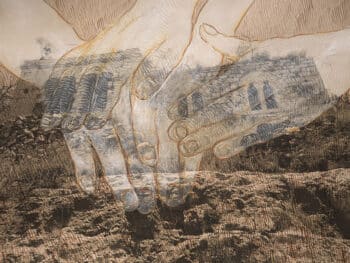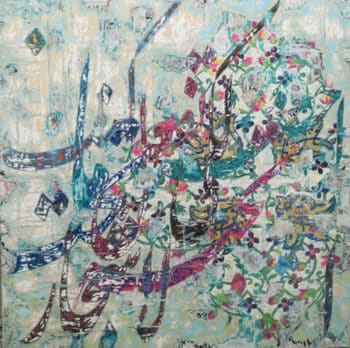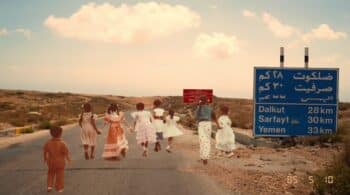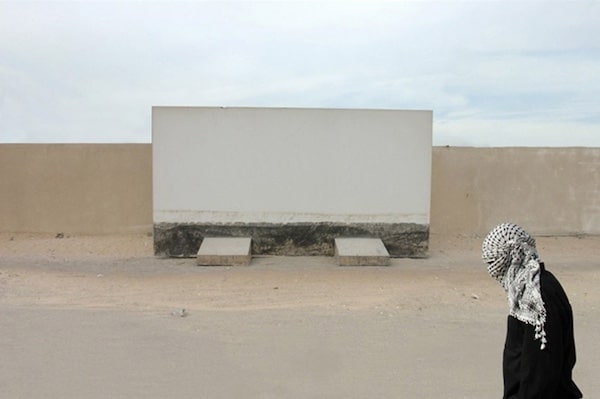Dear friends,
Greetings from the desk of Tricontinental: Institute for Social Research.

John Halaka (Palestine), Memories of Memories, 2023.
On 11 January, Adila Hassim, an advocate of the High Court of South Africa, stood before the judges of the International Court of Justice (ICJ) and said: ‘Genocides are never declared in advance. But this court has the benefit of the past 13 weeks of evidence that shows incontrovertibly a pattern of conduct and related intention that justifies a plausible claim of genocidal acts’. This statement anchored Hassim’s presentation of South Africa’s 84-page complaint against Israel’s genocide of Palestinians in Gaza. Both Israel and South Africa are parties to the 1948 Genocide Convention.
The filing by the South African government documents many of the atrocities perpetrated by Israel as well as, crucially, the declarations of intent to conduct genocide made by senior Israeli officials. Nine pages of this text (pp. 59 to 67) list ‘expressions of genocidal intent’ made primarily by Israeli state officials, such as calls for a ‘Second Nakba’ and a ‘Gaza Nakba’ (Nakba, which means catastrophe in Arabic, refers to the 1948 expulsion of Palestinians from their homes that led to the creation of the state of Israel). These chilling declarations of intent have appeared repeatedly in the Israeli government’s speeches and statements since 7 October alongside racist language about ‘monsters’, ‘animals’, and the ‘jungle’ to refer to Palestinians. In one of many such instances, Israel’s Defence Minister Yoav Gallant said on 9 October 2023 that his forces are ‘imposing a complete siege on Gaza. No electricity, no food, no water, no fuel. Everything is closed. We are fighting human animals and we are acting accordingly’.

Ibrahim Khatab (Egypt), Do What You Want Under the Trees, 2021.
Tembeka Ngcukaitobi, another advocate from South Africa, described these words as a ‘language of systematic dehumanisation’. This language, alongside the character of Israel’s assault—which has thus far claimed over 24,000 Palestinian lives, displaced nearly the entire population of Gaza, and plunged 90% of the population into acute food security—should provide a sufficient basis for the accusation of genocide.
It is fitting that Adila Hassim’s first name means righteousness or justice in Arabic and Tembeka Ngcukaitobi’s first name means trustworthy in Xhosa.
At the ICJ hearing, Israel was unable to respond credibly to South Africa’s complaint. Tal Becker, a legal advisor to Israel’s Ministry of Foreign Affairs, spent his entire presentation trying to indict Hamas, which is not a party to the dispute. It was Hamas, Becker said, that created the ‘nightmarish environment’ in Gaza—not Israel.
After Israel made its case, the fifteen ICJ judges began their deliberations. The presentations on 11—12 January were merely the prima facie hearing to ascertain whether there is sufficient evidence to proceed to a trial, which—if it happens—would likely take years. However, South Africa asked the court to apply ‘provisional measures’, namely an emergency order from the ICJ judges calling on Israel to stop its genocidal attack on Palestinians. This would be a significant blow to Israel’s already diminished legitimacy as well as the legitimacy of its major backer, the United States of America. There is considerable precedence for this measure. In 2019, Gambia was able to get the court to order provisional measures against the government of Myanmar for its attacks on the Rohingya people. The world awaits the court’s verdict.

Shaima al-Tamimi (Yemen), So Close Yet So Far Away, 2018.
The day before the hearings began, the U.S. released a statement saying ‘allegations that Israel is committing genocide are unfounded’. Once more, the U.S. government fully backed Israel, intervening on its behalf not only in words but by providing arms and logistical support for the genocide. That is why South Africa is now preparing a filing against the United States and the United Kingdom to be submitted to the ICJ.
In November 2023, when the genocidal character of the war was already widely accepted across the globe, U.S. Congress passed a $14.5 billion package in military aid to Israel. While the ICJ held its hearing, U.S. National Security Council spokesperson John Kirby told the press that the U.S. will ‘continue to supply [Israel] with the tools and capabilities they need’, which it did—again — as recently as 9 and 29 December, when it transferred additional arms to Israel. When asked about loss of life concerns within Congress, Kirby said that ‘we still see no indication that [Israel is] violating the laws of armed conflict’. Kirby, a former admiral, acknowledged that ‘there are too many civilian casualties’. However, rather than calling to end attacks on civilians, he said that Israel must ‘take steps to reduce that’. In other words, the U.S. has given Israel the green light and carte blanche support, and arms, to do whatever it would like to Palestinians.

Chie Fueki (Japan), Nikko, 2018.
When the people of Yemen, led by Ansar Allah, decided to block the movement of ships to Israel through the Red Sea, the U.S. formed a ‘coalition’ to attack Yemen. On the day of South Africa’s presentation at the ICJ, the U.S. bombed Yemen. The message was clear: not only will the U.S. provide unconditional support for the genocide; it will also attack countries that try to put a stop to it.
The atrocities perpetrated by Israel, as well as the resistance of the Palestinian people, have moved millions across the world to take to the streets, many of them for the first time in their lives. Social media, in almost all the world’s languages, is saturated with content decrying Israel’s terrible actions. The focus of attention does not seem to be diminishing, with 400,000 people marching on the U.S. capitol last weekend in larger numbers than ever in the country’s history. The increasing fervour and scale of these demonstrations have provoked concerns in the Democratic Party that U.S. President Joe Biden will lose not only the Arab American vote in such key states as Michigan, but that liberal-left activists will not support his re-election campaign.
Over the course of the past two years, from the start of the Ukraine War until now, there has been a rapid decline in the West’s credibility. This drop in legitimacy did not begin with the Ukraine War or genocide in Palestine, though both events have certainly accelerated the decline in the authority of the NATO countries. Ansar Allah spokesperson Mohammed al-Bukhaiti posted a video of a pro-Palestine march in New York that is perhaps indicative of the mood in most of the world and wrote: ‘We are not hostile to the American people, but rather to the American foreign policy that has caused the death of tens of millions of people, threatens the security and safety of the world, and also exposes the lives of Americans to danger. Let us struggle together to establish justice among people’.

Athier Mousawi (Iraq-Britain), A Point to A Potential Somewhere, 2014.
Since the start of the Third Great Depression in 2007, the Global North has slowly lost its control over the world economy, technology and science, and raw materials. Billionaires in the Global North deepened their ‘tax strike’, siphoning a large share of social wealth into tax havens and unproductive financial investments. This left the Global North with few instruments to maintain economic power, including the ability it once held to make investments in the Global South. Later this month, Tricontinental: Institute for Social Research will release a new dossier, The Churning of the Global Order, and a study, Hyper-Imperialism: A Dangerous Decadent New Stage, which detail the maladies of the present and the new mood created by the rise of the Global South. The ICJ complaint filed by South Africa and backed by several Global South states is an indication of this mood.
It is clear to most people in the world that the Global North has failed to address planetary crises, whether the climate crisis or the consequences of the Third Great Depression. It has tried to substitute reality with euphemisms such as ‘democracy promotion’, ‘sustainable development’, ‘humanitarian pause’, and, from UK Foreign Secretary David Cameron and Germany’s Foreign Minister Annalena Baerbock, the ridiculous formulation of a ‘sustainable ceasefire’. Empty words are no substitute for real actions. To speak of a ‘sustainable ceasefire’ while arming Israel or to speak of ‘democracy promotion’ while backing anti-democratic governments now defines the hypocrisy of the Global North’s political class.
On 12 January, the German government released a statement saying that it ‘firmly and explicitly rejects the accusation of genocide that has now been made against Israel’. In line with the new mood in the Global South, the government of Namibia reminded the Germans that they had ‘committed the first genocide of the 20th century in 1904—1908, in which tens of thousands of innocent Namibians died in the most inhumane and brutal conditions’. This is known as the Herero and Namaqua genocide. Germany, said the government of Namibia, ‘is yet to fully atone for the genocide it committed on Namibian soil’. Therefore, Namibia ‘expresses deep concern with the shocking decision’ of the German government to reject the indictment of Israel.
 Israel, meanwhile, says that it will continue this genocide for ‘as long as it takes’, though its already tenuous justifications continue to deteriorate with increasing rapidity. Behind this violence is the waning legitimacy of the NATO project, whose sanctimonies sound like nails being dragged across a bloodied chalkboard.
Israel, meanwhile, says that it will continue this genocide for ‘as long as it takes’, though its already tenuous justifications continue to deteriorate with increasing rapidity. Behind this violence is the waning legitimacy of the NATO project, whose sanctimonies sound like nails being dragged across a bloodied chalkboard.
Warmly,
Vijay.
PS: Please do not miss the panel discussion based on our recent dossier, Culture as a Weapon of Struggle: The Medu Art Ensemble and Southern African Liberation, which widens the focus from South Africa to Palestine, featuring Wally Serote (poet laureate of South Africa and the founding chairperson of the Medu Art Ensemble), Judy Seidman (cultural worker and member of the Medu Art Ensemble), Clarissa Bitar (award-winning Palestinian oud musician and composer), and Niki Franco (cultural worker). The event will be hosted by our very own Tings Chak as well as Hannah Priscilla Craig of Artists Against Apartheid and livestreamed on 21 January via The People’s Forum YouTube page at 20:00 (Johannesburg), 18:00 (London), 15:00 (São Paulo), and 13:00 (New York). Register here.

